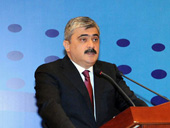The IMF could provide cheaper loans to Azerbaijan - Minister of Finance
Tuesday, July 19

“The IMF said the decrease in oil price would have a positive impact on the global economy. It has not happened,” Samir Sharifov, Azerbaijan’s finance minister, told the Financial Times.
“The stigma of [needing assistance from] the IMF prevents many countries from approaching the fund to address a very small problem before it becomes really big.”
Mr Sharifov’s complaint hits at a concern for the IMF. In the wake of the collapse of global oil prices, a growing number of governments have shunned the IMF’s emergency lending in favour of low interest loans from the World Bank. The bank said last week that its total lending in the fiscal year to the end of June surged to $61bn largely because of growing demand for such budgetary support.
Azerbaijan, which has traditionally relied on hydrocarbons for 95 per cent of its exports, briefly flirted with a $4bn package of loans from the IMF and World Bank early this year. Mr Sharifov said the country, with little debt and a sovereign wealth fund worth $34bn, never needed “bailing out”. But he added the IMF could have provided Azerbaijan with much cheaper loans than the market rate.
“If we borrowed [at a rate of] around 7 per cent, and there is a funding which is available at much cheaper terms, for example, from IMF it would be . . . 1 per cent . . . why should I not blend it?” he asked. “For me it is not an issue of bailing out the economy, it is an issue of funding — the way I can get cheap funding.”
The IMF tried to address the stigma attached to its emergency lending by creating new precautionary facilities following the 2008 global financial crisis. Those facilities have been tapped by countries such as Mexico and Kenya but their use remains relatively rare. Mr Sharifov said the IMF was working on “four or five new products” to address the issue. “This is the kind of conversation which the IMF is having with many oil rich countries,” he said. “Some of course borrow from international capital markets. At the same time there is an institution sitting on cash which they cannot basically disburse.”
Baku is in talks with a range of international financial institutions, including the World Bank.
“The European Bank for Reconstruction and Development, the Asian Development Bank, are investing $5bn in loans and guarantees to fund its share of a pipeline project that would deliver Caspian gas directly to Europe for the first time,” Mr Sharifov said. Azerbaijan would be able to fund its share of the project, estimated at $13bn, even without support from international organizations, he added.
“Despite the shock that we have experienced, I believe we are resilient,” Mr Sharifov said. “President Aliyev directed the government to prepare for the so called post oil era. This is the policy which we now have to accelerate.”
(Trend.az)
